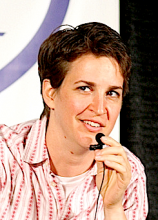Rachel Maddow

Rachel Maddow gave a talk at Stanford for the Center on Ethics in Society's 25th anniversary. Apparently, Rachel Maddow graduated from Stanford and wrote an honors thesis in Ethics in Society. And, apparently, the Ethics in Society honors program has students read and critique her honors thesis even today. Cool!
Drift
Maddow wrote the book, Drift: The Unmooring of American Military Power, about how civilians and the military are becoming increasingly disconnected from each other. There were a number of disturbing issues that she raised. For instance, the military has a set of priorities, but congress decides what the military gets. The military doesn't think that it needs tanks or 5000 nukes, but the military is forced to buy and maintain them. At the same time, the military doesn't have enough funding for aircraft that have been used nonstop for the past decade, so those aircraft are increasingly falling into disrepair. All of this happens because congress wants to posture as if they are strong on the military without actually talking to the military.
The civil military divide has become increasingly prominent in the past few decades. One trend was decreasing the amount of congressional oversight and approval required for acts of war. Now, not only can the executive engage in war without congressional approval, but they can also engage in war at the same time as denying that they are engaging in war (ie, drone strikes that are under the control of the CIA rather than the military). It used to be much harder to go to war, and the founders thought that was a good thing, which is why they put control in congress.
Another trend alongside this is the rise of private military contractors. If a soldier dies in Iraq or Afghanistan, then we have to disclose that. If the military pays Blackwater to send an american civilian to die in Iraq or Afghanistan, then no one knows about it.
At the same time as these trends leading to to ridiculous budgets in congress, they also create interpersonal alienation between military families and civilian families. This alienation is one part fear, one part hero worship, and one part pity, but in any case, there is a lack of understanding, and that's a problem.
I thought that Maddow's arguments were very compelling. In my junior year of high school, there was a debate topic about national service, and many teams would advocate a return of the draft to reduce the civil military divide, so it's a problem that I have been acquainted with for a while.
Advocacy
When Maddow was at Stanford, she said that she wanted to be an activist and felt like she needed to gain skills. One set of skills was a clear ability to understand and research issues, but she didn't want to be a researcher or a professor. One set of skills was the ability to deliberate about policy, but she didn't wan to be a policymaker. What she wanted to do was convince people to adopt a certain policy and to change the world in a specific way. Thus, she learned how to make good arguments. She learned how to be a good writer and advocate. It made me think about the value of competitive policy debate.
In the question and answer period, she was asked about what she looks for in job applicants, and one interesting thing she said was that she looks for disciplinary, rather than interdisciplinary, applicants. She wants people who have developed one clear way of thinking and who know how to make their point rather than just connecting other points. While the work that I do is interdisciplinary, I only studied CS, and I think like a computer scientist (and a debater), and I do think that focusing on the one discipline has helped me think more clearly about interdisciplinary issues than diving right in to thinking about many issues would have.
Maddow was also very funny throughout. It was a great talk!



